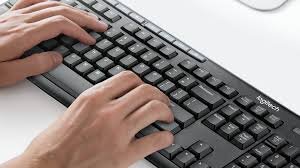
Input Devices
Key Points
There exists really 5 types of input devices: keyboard, mouse, trackpad, numeric keypad and a headset
These devices are also available in non-traditional designs to accommodate a given person’s ergonomic needs
You can minimize a musculoskeletal disorder with a properly fitted device(s) and a personalized layout of these devices on your desk.
Keyboards
TenKeyless (TKL) Keyboard
This keyboard is shorter than most keyboards and it’s because you are lacking the 10-key numeric keypad on the right. It’s great if you don’t have one because it frees up desk space and eliminates overreach to use your mouse if it’s on the right side of your keyboard. The TKL is my preference when using a computer.
Keyboard with Number Pad
The keyboard with a number pad is the most common keyboard that I’ve seen people use at work. It’s nice to have an attached number pad but I’ve found that most people rarely use it and consequently is a waste of space that could be better used for your mouse, if you use your mouse right of your keyboard.
Ergo Keyboards
There are a number of Ergo keyboards. The one above minimizes ulnar wrist deviation, which can decrease ulnar nerve compression and the long term affects of ulnar nerve compression. Of course, there are others and they all promote optimal joint alignment and comfort. If this is achieved, we can greatly minimize musculoskeletal disorders.
Mice
Mouse
This type is the most common you’ll find for your computer. When thinking of using this device, think of the size and how it fits in your hand. The most common issue is a size too small. This causes you to conform your hand into an unnatural position and perhaps grasp your mouse. Don’t clench your mouse during mouse use.
Ball Mouse
This type is another type that some people prefer and can be a great option if you want minimal to no mouse movement. The ball is used by your thumb to guide the pointer on your computer screen. This eliminates physically mouse movement. The only consideration would be if you have thumb issues.
Vertical Ergo Mouse
This type of mouse is one of my favorite mouse designs. It places your hand and wrist in a neutral position and decreases any awkward postures that might cause pain. That pain can be located at the wrist, elbow and/or shoulder. This is definitely a mouse to consider when selecting a mouse for your computer setup.
Trackpad
An alternative to the mouse is the trackpad. Same functional idea but has the added benefit of finger gestures that are customizable for quick input commands.
Numeric Keypad
A numeric keypad is an afterthought most of the time for the average layperson but if you’re an accountant, banker, etc. you’ll find yourself using this device a lot.
The only problem it presents is that it takes up space and adds an unnecessary reach for you mouse unless it’s separate from your keyboard and is positioned away from your mouse (i.e., the other side of the keyboard).
If you haven’t considered ditching your keyboard with an attached keypad and you want to make a more ergonomically workstation, consider investing in both a regular keyboard without a numeric keypad and a separate numeric keypad to make the most of your space and reduce the changes of sustaining a musculoskeletal disorder.
Headsets/Bluetooth Enabled Devices
Headphones
Using a phone receiver is pretty much obsolete today when we can use a headset, whether it’s wireless or not. As far as reducing the incidence of sustaining a musculoskeletal disorder, it’s far more practical to speak in this fashion or communicate via your computer, not to mention, it’ll free up your hands and make you more comfortable.
Do yourself a favor and invest in a headset or some form.
Ear Buds
Lastly, I would be remised if I didn’t mention ear phones or ear buds. This is what I use most of the time, so long as I can wirelessly connect them to my phone or computer. This is a game changer and a staple in my arsenal of technological gadgets.










